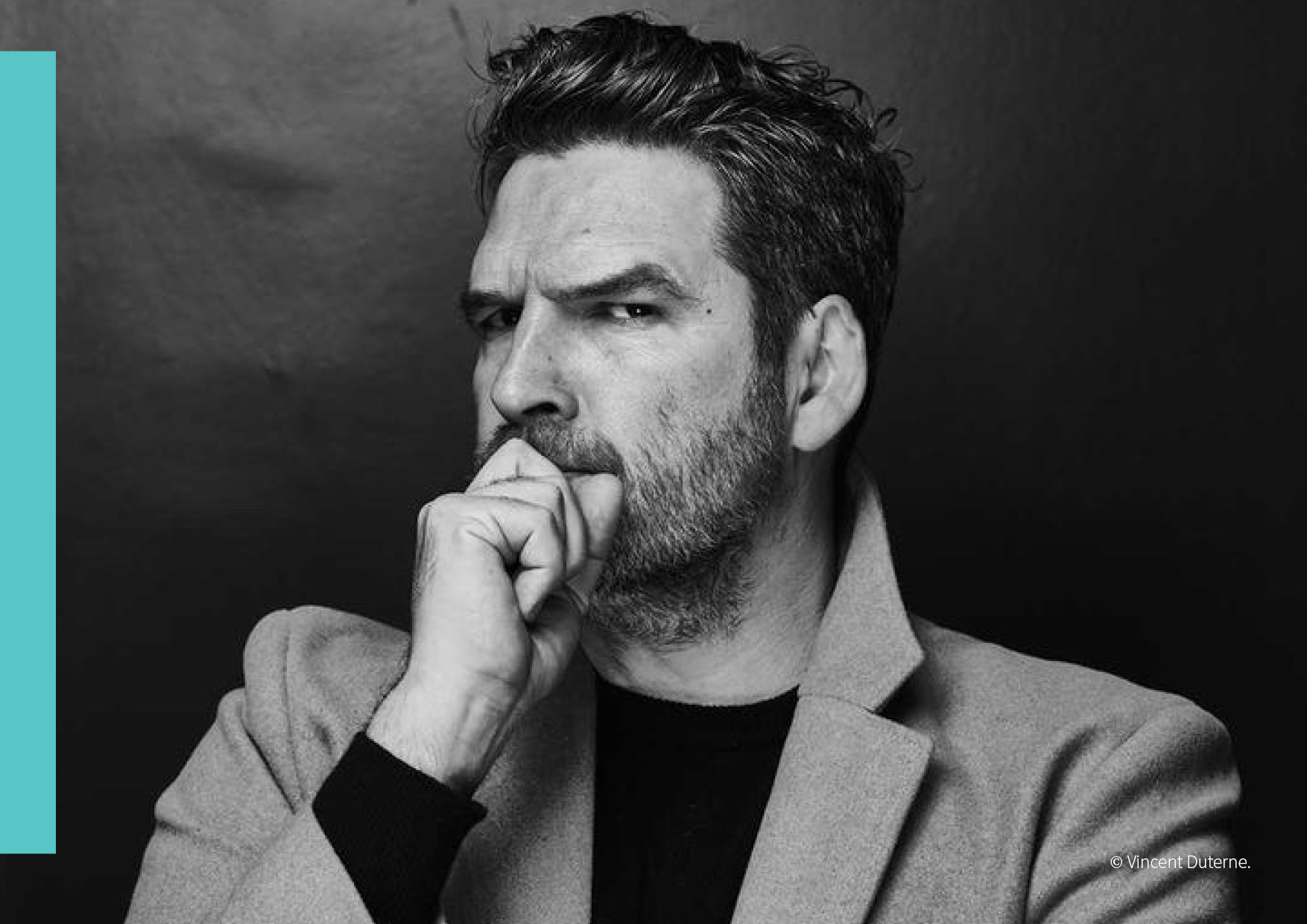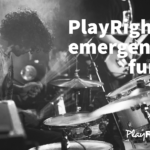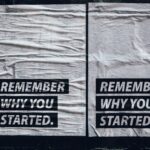About his life as an actor: Roel Vanderstukken speaks up
March 1 2021
Most people know him as ‘the Benny’ from the Flemish soap Familie, a character that he has been impersonating for almost ten years now. Recently he was also to be seen in the popular TV series Beau Séjour, and on top of that, he’s widely known in the theatre and music scene in Flanders. An interview with Flemish actor and musician Roel Vanderstukken: about his life as an actor, his favorite roles, challenges in times of Corona and tips for artists (to be)!
You’re most famous because of your character ‘Benny Coppens’ in Familie, and ‘Bart’ in Beau Séjour. Many people probably identify you, as a person, with those characters and address you with those names, instead of ‘Roel Vanderstukken’. How do you deal with that?
That has greatly evolved. Many indeed address me with my character name. Fortunately, those names have changed every now and then, I’ve played different roles over the past years. However, it took me a long time to get rid of the yoke of ‘Jelle’ from Wittekerke. But ‘Benny’ seems to be a tough one. That is of course also due to the fact that he is a popular figure with whom people can identify.
I used to have a hard time with that and even refused to respond when I was approached with my character name. I thought: “I also have a name of my own.” But you really just have to embrace that and perceive this not only as recognition, but also as a form of acknowledgement.
Have you always known that you wanted to be an actor? How did you get into the acting industry?
My dad had studied at the RITCS (Royal Institute for Theatre, Cinema and Sound), just like me. Both my parents were active in the amateur theatre, so during my childhood they dragged me along to rehearsals whenever they could not find a babysitter for me. Fortunately, I thought it was fun, it was kind of a living puppet show for me. My father was a director, and I was allowed to sit next to him, watching how he turned a sheet of paper with letters on it into some sort of living stage. That intrigued me and it pushed me to start acting, as well.
When I was eight years old, I had my first role in a “spectacle” here in our village. Some kind of celebration at the Church of Sint-Elooi. It was a very small role. I had to announce something in a bar after which another actor had to smash an egg onto my head. From then on, I developed an appetite for acting and I knew: I want to do that for the rest of my life.
As you get older, you realise that you’d probably better chosen another profession to dream of. Even if you are admitted to theatre school and graduate, it is no guarantee for a job. Acting is and will remain an uncertain existence.
But blood is thicker than water… The more uncertain this world became, and the more I was advised to chose against it, the greater my enthusiasm grew.
And anyways, it is out of necessity as well, because there is nothing else I am capable of doing (laughs). Acting and singing!
Now you mainly appear on the screen, but you are also active in the theatre world. What are the main differences between acting on stage and in front of a camera? Do you have a preference?
I still direct one production per year at the amateur theatre KVT Diest. I do not want to let go of that, because in the end, I did study to become a theatre director. But performing in theatre, theatre itself, that’s not where the money is. You should act if it is your passion, if it nourishes you, and combine it with working for television. I try to perform on stage every three or four years. Last year, we toured with ‘Closer’ by De Spelerij; three years before that I played in ‘Chaplin’ by Music Hall.
The biggest differences between TV and theatre… I like acting for television because it all happens very quickly. The days are often long: a normal day on set lasts ten hours, after which you come home and often need to study some more. That’s tough. A daily show like Familie goes even faster than, for example, Beau Séjour. I love that speed and I think that, as an actor, this allows you to become more technically skilled by taking into account camera angles, light, etc.
In theatre, on the other hand, there is one tension arc, one storyline per evening. Within that one tension arc, you need to switch constantly. It is more of a living organism, also because of the direct contact with the audience. Generally, you feel their appreciation through the applause afterwards, and that is not the case with television.
But the combination of both ensures that I’m not yet tired of neither.
What was the most fun or challenging role you have played yet?
The most challenging one was the role of ‘Ben’ in Niets, a theatre performance I created together with Nic Balthazar. Nic had written a booklet on behalf of Stichting Lezen. It was a story about an autistic boy who had jumped off the Gravensteen in Ghent because he was being bullied. I had read the story on behalf of Stichting Lezen to promote it in schools and the like, and it really appealed to me from the start. That was during my last years with Wittekerke and the early years with Flikken. As i wanted to gain more experience in theatre, a monologue was the most interesting option: it sells better and the shows are less expensive. The play appealed to me because it was a theme that both attracted schools and a huge adult audience. In the end, the show was so popular that I sometimes performed three times a day, two seasons long, meaning over a 150 shows in total.
It was tough, hard-core. I had to push hard to put myself in the position of an autist. But I’ve learnt a lot from it.
And the most fun role… good question. All roles are fun to play, but I think that ‘Benny’ is one of the funniest characters I’ve played so far. He’s in any case the dumbest bastard I’ve ever played (laughs). He just doesn’t get it, and is always late with everything. It’s nice to create this childlike character of myself.
Due to Corona, many cultural activities were canceled, recordings were postponed, etc. Has this had a major impact on you?
During the first lockdown, all recordings of Familie were put on hold for 2.5 months. Financially, that makes a difference. In addition, all concerts were cancelled. Fortunately, we had finished the last performance of ‘Closer’ three weeks before. ‘Oud papier’, a performance with Stanny Crets, was due to premiere in mid-April, but we were forced to stop rehearsing.
Regarding my music project De Corsari’s, the entire agenda disappeared. That was a major financial loss, but it’s nothing compared to many of my colleagues who have been completely left to their own devices. Real dramas are unfolding behind the scenes in our world. For musicians, technicians, actors… That small, select group that is currently able to work for television might kiss both hands, I think.
In the meantime, we are again recording Familie according to strict measures. Furthermore, I do some commercials and trailers for VTM. Rehearsals for theatre, however, are still at a standstill, there are no physical performances. When it comes to the music festivals and shows, we’ll have to forget about those this summer as well, I fear. It’s poignant.
As artists, we are left out in the cold regarding support measures. The artist statute does not amount to much anyway, and the few rights that we have seem to be taken from us even further. I have the impression that we are destroying our own culture. Brainstorming TOGETHER WITH the sector about solutions, support measures and systematically restoring the cultural sector, that simply does not happen.
One thing that is good about this crisis, though, is that it surely stimulates creativity. Many people are forced to reinvent themselves.
Which projects are on your 2021 agenda?
My contract with Familie runs until April 2022. Besides that, we have a livestream planned with De Corsari’s on the 13th of March, without a live audience, unfortunately.
In addition, I had a new production on the agenda but that will probably be cancelled. In terms of music shows, I hope to be able to do a couple of shows in the fall. For example, a music program with music of Wim De Craene, an idea of his son Ramses. We should be starting rehearsing soon… but it is all still very uncertain. I hope we will be able to continue activities with Familie.
About PlayRight: You have been affiliated with us for years now. Do you know what PlayRight does for you exactly, and what the benefits are of being a member?
What PlayRight does for me: managing my worldwide rights for all my performances. That means that, whenever something I played in is broadcast in Belgium or elsewhere, they collect and pay out these rights for me. They also do so for my music recordings and dubbing performances.
If the artist himself would have to figure it out all by himself… well, you just have no control over such things: what, where, when and how something is broadcast. PlayRight does a very good job, so thank you!
In fact, you should consider these neighbouring rights as a tax that the viewer pays on the possibility of recording a program in which you perform. The former video recorders and digiboxes of this time are the little machines that generate a bit of money for us. That is only a small part, though, because the vast majority of our rights are gobbled up by the producers, although we are entitled to these rights. It remains a huge fight.
And also that last piece of neighboring rights is in danger of disappearing because soon, everything will be sent via the cloud. The moment when that small box also disappears from people’s living rooms… we will lose that last part of rights, which would be a disaster.
Fortunately, PlayRight, together with De Acteursgilde, is doing a good job. United strengths!
Do you think that artists are sufficiently informed about neighbouring rights?
I notice that many of my colleagues do not, or insufficiently, know about the existence and advantages of PlayRight. But once you know of its existence and are affiliated, however, you get sufficient information. PlayRight is very accessible to its members, I call them regularly.
I suppose an effort could be made to reach artists who do not really know about PlayRight. Although that is not evident in such a fragmented landscape.
Moreover, I am convinced that we, as actors, can also contribute by informing younger colleagues and helping out older colleagues with the declaration of their performances.
At the start of the Corona pandemic, PlayRight established the PlayRight+ emergency fund, intended to financially support its affiliated performers whose activities had been cancelled. Did you apply for support?
I did not apply for financial support, as I am self-employed and that is a separate statute. Besides, I was lucky enough to restart recording Familie after 2.5 months.
But I can only be happy that PlayRight is also there for its members in hard times. I think you have played an important role for many people who were struggling to keep on paying the bills. This is less of an issue for me and a number of other actors who are fortunate to be able to work for television even now. We also have suffered considerable damage, but that is small beer compared to what others might have been through.
What else could PlayRight do for (future) performing artists? Workshops, info sessions,…?
Reaching artists is important. It might be interesting to engage international collecting societies, or professionals with a a broad knowledge about legal affairs in the sector, and organise information sessions together with them.
It is not easy to get artists motivated for this, but in the digital age, online session could be a solution. Those are more easily accessible.
Finally, what are some of the greatest life lessons you have learnt as an actor? Are there certain values that you hold onto firmly?
I am definitely not going to contradict the importance of an education, but I see a many colleagues around me who have not completed their education or were not considered good enough at theatre school, but are now really successful and making a living by acting. On the other hand, there are many who graduated superbly, but chose another job after a couple of years due to a shortage of acting jobs.
You have to be lucky. And once you have a job, you should be aware that it is an ongoing training. You must realise that you can and must continue to learn every single day and seize every opportunity.
Secondly, the importance of the variety of people you meet: without having to switch jobs, actors interact with many different people throughout their careers. Every actor has its own backpack with experiences and it’s always worthwhile to learn from one another. Open up to that. If you monitor and maintain that form of openness, you have already taken a lot of steps to attain good results.
Do you have any advice for students who are about to graduate and want to start acting for theatre or television?
DON’T DO IT (laughs)! No, that is not true. There is a lot that I could say. Have a Plan B, for example. That will save you a lot of stress.
On the other hand, it prevents you from being busy with your passion, with art. It undermines the artist’s existence as it is easier to flee from it.
But still, be aware of the risks of the profession and realise that there are only a limited amount of places. But above all: try to live in the ‘here’ and ‘now’. On stage, in front of the camera, but also just by yourself in life.
A wise lesson about life that surely does not only apply to artists but to everyone! We are looking forward to seeing more of Roel in the months and years to come!





